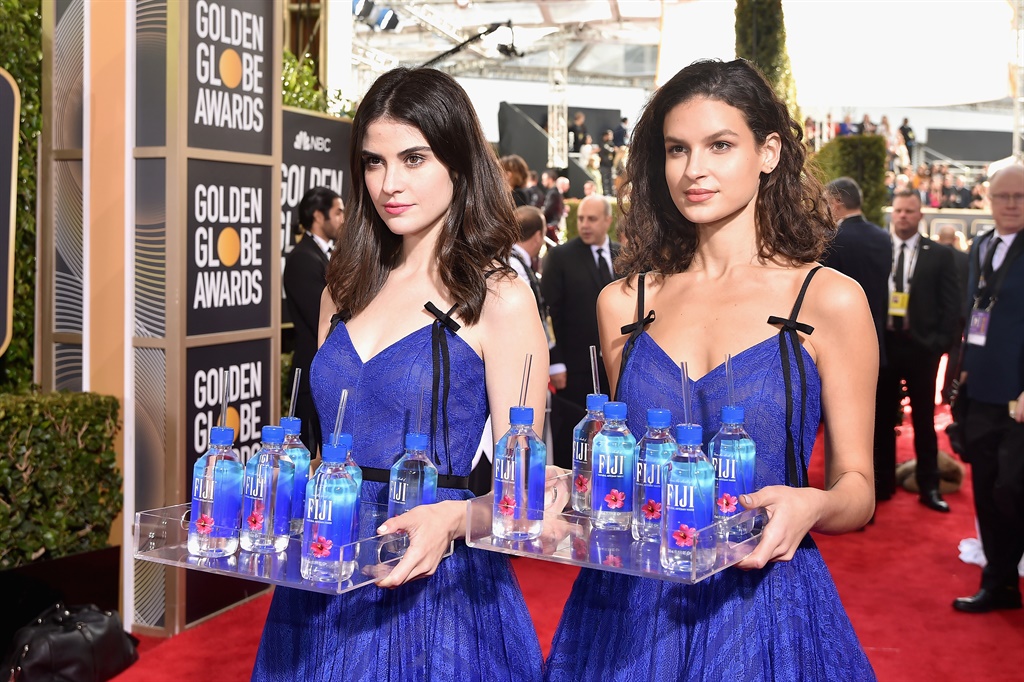
Kelleth Cuthbert, the model who gained notoriety at the Golden Globes, has joined a number of prominent celebs who have clashed with brands over the misuse of their “name and likeness”. This phrase comes up more often during the digital age influencer business model and digital media law.
The model is reportedly suing Fiji Water for an unauthorised campaign using her “photograph, likeness and identity” after a picture taken during the awards was used in a separate campaign. Kelleth gained popularity on social media after being spotted at the awards, earning her the name “Fiji water girl”.
Kelleth reportedly did not agree to cardboard cutouts of her for the company’s marketing campaign. And, of course, Kelleth is not the only person to either express discontent or sue brands for misusing their money-making traits.
Soon after the Golden Globes, Jamie Lee Curtis shared her own gripe with Fiji Water’s methods to promote its product. In an unhappy Instagram post, Jamie wrote: “I specifically moved away from the blatant promotions by Fiji and Moet… I moved away as I said out loud that I didn’t want to be doing advertising for either.”
Sex and the City star Sarah Jessica Parker reportedly sued jeweler Kat Florence Design for benefiting from her name and likeness without payment. According to MSN, the brand did not honour its $7.5 million deal to SJP and continued to use photographs of her face in promotions.
Alfonso Ribeiro, who played Carlton in the Fresh Prince of Bel-Air, is also suing a company for misusing his likeness. He is one of a few personalities suing video game company, Epic Games, for using their iconic dance in one of their video games. Business Insider reports that the lawsuit accuses the company of misappropriating the recognisable moves known as "The Carlton" – which are associated with Alfonso, who played the character Carlton.
According to Times Live, in South Africa, businesswoman and former Miss South Africa Basetsana Kumalo sued sports shop Cycle Lab for using her image without consent. The Saturday Star reported that the court said that Basetsana’s right to identity had been violated because the ad created a wrongful impression of endorsement.
The examples mentioned above are all people with some celebrity and have the capacity to endorse products. As many may know by now, Kelleth happens to be a professional model and because of her stint at the Golden Globes she has also gained celebrity herself.
So what does it mean when likeness in misused and what are your rights? We spoke to Attorney Vera Kruger, a senior associate at Abrahams & Gross, about your rights – as someone who is likely to endorse products.
In South Africa, Vera says misuse of likeness happens when “a business or individual uses someone’s name, photograph, or other defining attributes or ‘likeness’ for commercial purposes, such as advertising or other promotional activities”.
She says that it may also occur when a person’s identity is used by someone for another person’s own personal benefit, whether or not the purpose is commercial.
Vera says, in South Africa, the Constitution recognises the right to dignity and personality rights. “‘Privacy’, ‘dignity’, ‘identity’ and ‘reputation’ are facets of personality.”
The U.S., she says, has the contemporary right of publicity, which has two underlying bases: privacy and economic exploitation.
She explains that: “The right of publicity generally protects a proprietary interest in one’s marketable image from unauthorised use for commercial purposes. It is, however, not easy to clearly mark the scope of what is ‘commercial’.
READ MORE: Could 2019 be the year you finally start your own business?
“Instead, it is less challenging to point out what is not commercial — for instance, one’s image used in news reporting, commentary, entertainment, works of fiction or nonfiction.”
So if a person, firm or corporation would be guilty of a misdemeanour if they use the name, portrait or picture of any living person for advertising purposes or of trade without a written consent of such person.
“An individual has sole rights to their persona being used for commercial promotion. Therefore, unauthorized commercial use of an individual’s name, image, likeness, reputation, or other recognisable aspects of identity would be illegal,” says Vera.
In Basetsana’s case the court said that the right to identity is personal and cannot be transferred.
Have you had an experience where your identity was misused by another person or brand? Chat to us here if you would like to share with us.
Sign up to W24’s newsletters so you don't miss out on any of our hot stories and giveaways.




 Publications
Publications
 Partners
Partners










